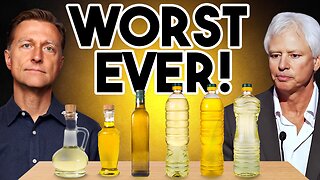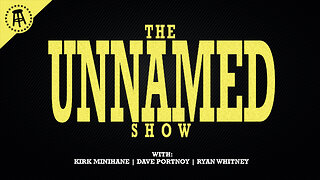Your Brain ONLY Needs Glucose (Carbohydrates) is a MYTH! – Dr.Berg
Does the brain need glucose? The truth may surprise you.
Timestamps:
0:39 How the body uses ketones
2:14 Why ketones are better than glucose
2:37 Ketosis vs. ketoacidosis
3:28 How to avoid keto side effects
4:55 Why keto doesn't cause high cholesterol
In this video, I want to talk about why the statement, "your brain needs glucose" is a myth. The brain doesn't need to run on glucose (sugar and carbohydrates). If it did, how would you explain the people who cut out all carbs and sugars?
You only have 72 hours of fasting glucose before your body is tapped out of glycogen (stored glucose). What happens when there's no glucose? After your glycogen stores are gone, your body starts to run on a different fuel source: ketones.
The body converts stored fat into ketone fuels. This is known as the metabolic state of ketosis. Burning fat is actually much healthier than burning sugar. The brain prefers ketones over glucose. Some research even shows it can help prevent or improve dementia, like Alzheimer's.
Running on glucose can cause insulin resistance. It's my personal belief that insulin resistance and dementia are related. This would explain why so many diabetics have problems with dementia and memory loss.
Ketosis and ketoacidosis are completely different things. Ketoacidosis is a problem that happens when you're diabetic, where your body's pH level is thrown off. This creates a lot of side effects. Ketosis is a healthy state—unlike ketoacidosis.
Many are concerned about ketosis side effects, like bad breath, digestive problems, etc. However, these problems don't happen if you consume enough healthy vegetables. You need vegetables to keep your body healthy and nourished.
The ketogenic diet is one of the best diets you could go on for weight loss and health.
Also, keep in mind that consuming fat doesn't raise your cholesterol unless you also consume sugar and carbs. When you consume more cholesterol foods, your body simply makes up for it by creating less.
Dr. Eric Berg DC Bio:
Dr. Berg, age 57, is a chiropractor who specializes in Healthy Ketosis & Intermittent Fasting. He is the author of the best-selling book The Healthy Keto Plan, and is the Director of Dr. Berg Nutritionals. He no longer practices, but focuses on health education through social media.
Follow Me On Social Media:
Facebook: https://bit.ly/FB-DrBerg
Instagram: https://bit.ly/IG-DrBerg
Anchor: https://bit.ly/Anchor-DrBerg
TikTok: https://bit.ly/TikTok-DrBerg
Send a Message to his team: https://m.me/DrEricBerg
ABOUT DR. BERG: https://www.drberg.com/dr-eric-berg/bio
Disclaimer:
Dr. Eric Berg received his Doctor of Chiropractic degree from Palmer College of Chiropractic in 1988. His use of “doctor” or “Dr.” in relation to himself solely refers to that degree. Dr. Berg is a licensed chiropractor in Virginia, California, and Louisiana, but he no longer practices chiropractic in any state and does not see patients so he can focus on educating people as a full time activity, yet he maintains an active license. This video is for general informational purposes only. It should not be used to self-diagnose and it is not a substitute for a medical exam, cure, treatment, diagnosis, and prescription or recommendation. It does not create a doctor-patient relationship between Dr. Berg and you. You should not make any change in your health regimen or diet before first consulting a physician and obtaining a medical exam, diagnosis, and recommendation. Always seek the advice of a physician or other qualified health provider with any questions you may have regarding a medical condition.
Thanks for watching. I hope this helped clear up why your brain doesn't need glucose.
-
 34:51
34:51
Dr. Eric Berg
9 days agoThe Worst Ingredient in the World: Interview with Dr. Chris Knobbe
7.94K42 -
 1:07:54
1:07:54
Ben Shapiro
2 hours agoEp. 2007 - IT'S HAPPENING: Dems Launch COUP Against Biden?!
47.3K37 -
 LIVE
LIVE
TheAlecLaceShow
3 hours agoGuests: Mike Benz | John Amanchukwu | SS Kimberly Cheatle Should Be Arrested | The Alec Lace Show
752 watching -
 LIVE
LIVE
MissesMaam
4 hours agoZoo Keepin' ✨| Mornin' chill n' chat 💚
345 watching -
 1:59:28
1:59:28
The Charlie Kirk Show
2 hours agoThe Return of the King: The Republican National Convention, Day 4 | Navarro, Presler, Sen. Rubio
120K42 -
 53:31
53:31
The Dan Bongino Show
4 hours agoThe Troubling Truth Is Starting To Emerge (Ep. 2289) - 07/18/2024
691K2.84K -
 49:36
49:36
Dave Portnoy
5 hours agoThe Unnamed Show With Dave Portnoy, Kirk Minihane, Ryan Whitney - Ep. 22
44.1K3 -
 1:29:37
1:29:37
Steve-O's Wild Ride! Podcast
1 day agoBert Kreischer Is Disappointed -Wild Ride #224
49.4K4 -
 33:40
33:40
Blue Siesta ASMR
2 hours agoASMR Sims 4 Gameplay | Pregnant with the MOST TOXIC guy in the house | Soft Spoken
11K -
 2:01:21
2:01:21
LFA TV
9 hours agoTHE FIX IS IN! | LIVE FROM AMERICA 7.18.24 11am EST
82.9K51